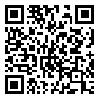BibTeX | RIS | EndNote | Medlars | ProCite | Reference Manager | RefWorks
Send citation to:
URL: http://bloodjournal.ir/article-1-1582-en.html
A B S T R A C T
Background and Objectives
ABO grouping is one of the most important pre-transfusion test in blood banks, requiring concordance between forward (cell-type) and reverse (back-type) methods. ABO discrepancies arise when these two methods yield mismatched results, necessitating resolution to prevent adverse outcomes. A rare but significant cause of such discrepancies is the presence of weak B subgroups, characterized by markedly low B antigen expression. These subgroups are detected through the adsorption & elution method, which is very difficult and time-consuming. Molecular techniques offer a more accurate and efficient alternative for detecting these variants. This study presents three uncommon cases of weak B subgroups, in which ABO grouping failed using serological methods and was clarified by molecular method.
Case Reports
Three patients samples were referred to the Immunohematology Reference Laboratory for ABO discrepancy analysis. The first case involved an 18-years-old female hospitalized for gastric surgery; the second, a 42-year old female undergoing cesarian section. In both cases, the packed RBC were requested and their mothers reported an O positive blood group. The third case was a 15-year-old mail with a mental disability whose sample was sent due to unresolved ABO grouping result. The cell-type and back-type ABO grouping was performed using both automated and tube methods. The results showed different discrepancies: cell-type grouping suggested weak B antigens, while the back-type grouping was cconsistent with group O. To resolve this incompatibility, Molecular testing was conducted using the PCR-SSP technique. The molecular results confirmed the presence of the B allele in all three cases. These molecular findings, integrated with serological results, support the classification of all patients as carriers of weak B subgroups.
Conclusions
The Molecular methods serve as valuable complements to serological methods in accurately determining ABO blood groups in both donors and patients. Notably, ABO genotyping plays a critical role in confirming weak expression of A or B antigens, especially in cases where serological results are inconclusive.
| Rights and permissions | |
 |
This work is licensed under a Creative Commons Attribution-NonCommercial 4.0 International License. |







